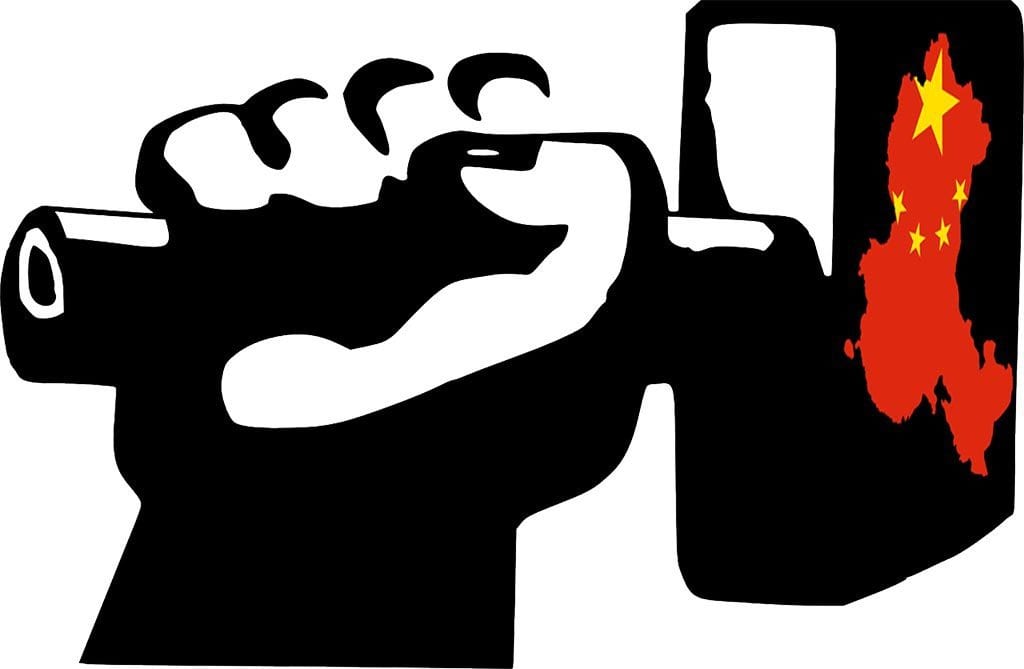
China’s Approach: Rewarding Moderate Muslims, Punishing Radicals
Updated August 2023
Yinchuan, China – Amidst the intricate tapestry of China’s diverse ethnic landscape, the Muslim Hui community stands as a notable exception—an ethnic minority that enjoys a remarkable degree of autonomy and religious freedom, even within a nation where Islam is steadfast.
The historical Silk Road, a legendary trade route traversed through what we now know as the Ningxia Hui Autonomous Region, served as an irresistible call for Muslim traders from distant lands. In the 7th century, descendants of Arab and Persian merchants embarked on journeys to this region, and many chose to establish their homes here, profoundly embedding the roots of Islam in the heart of China. It is worth noting that approximately half of China’s 20 million Muslims belong to the Hui ethnic group.
In stark contrast to the treatment of other Muslim populations in China, particularly the Uighurs in the western regions, the Hui Muslims have experienced fair and accommodating conditions. Unlike their counterparts in Xinjiang, the Hui have not been subjected to bans on their religious practices or faced punitive measures. Instead, they have forged a harmonious coexistence with the Han, the predominant ethnic group in China, creating a vibrant cultural tapestry where religious and ethnic diversity is celebrated.
The Hui’s peaceful assimilation into Chinese society serves as a testament to the nation’s ability to accommodate diverse religious and ethnic communities, fostering unity within China’s rich cultural mosaic. This stark contrast in treatment underscores the complexity of China’s approach to its various Muslim populations, where the Hui are indeed an exceptional case of accommodation and coexistence.
The harsh reality of China’s Muslim divide
The Hui Muslim community in Ningxia has experienced a different reality than their Uighur counterparts in China’s far west. While Uighurs face religious restrictions and repression, the Chinese government has granted the Hui Muslims more political and religious freedom. This difference can be attributed to the historical relations between the Hui and the ethnic majority of the Han population.
With over 400 mosques and Islamic schools producing thousands of imams, Ningxia has become a thriving centre for Islam. The government has implemented religion-training programs to support the development of Islam in the region. This approach has fostered a harmonious coexistence between the Hui and the Han communities.
Imam Ma Zhang Wen, who has served as an imam in Yinchuan for the past 15 years, acknowledges the respect and mutual understanding between the Hui and the Han. He emphasizes that the Han people respect the Hui Muslims, and in turn, the Hui Muslims respect the Han.
The cultural integration and historical ties between these communities have played a significant role in shaping the religious landscape of Ningxia. The Hui Muslims have been able to practice their faith more freely, creating an environment where Islam can flourish. full story
Economic Incentives for Moderate Muslims
China has implemented various strategies to reward moderate Muslims by focusing on improving the local economy in regions with significant Muslim populations. By investing in infrastructure, promoting business opportunities, and providing economic incentives, the Chinese government aims to uplift these communities and foster a sense of stability and prosperity.
For instance, in Ningxia, where the Hui Muslim community resides, the government has initiated projects to boost tourism, agriculture, and trade. This includes the development of cultural and religious tourism, such as the establishment of halal food markets and the promotion of Islamic cultural heritage sites. These efforts attract visitors and create employment opportunities for local residents, benefiting the Hui Muslim population.
Development of Halal Industries
China has recognized the potential of the halal industry and its significance to the Muslim community. To support moderate Muslims, the government has actively encouraged the growth of halal industries, including halal food production, halal certification services, and halal tourism.
For example, in regions like Xinjiang and Ningxia, the government has facilitated the establishment of halal food processing plants and encouraged local businesses to obtain halal certifications. This ensures that the dietary needs of Muslims are met and opens up new markets for these products, both domestically and internationally.
Educational and Vocational Opportunities
China has also prioritized providing educational and vocational opportunities for moderate Muslims. By investing in education and skills training, the government aims to empower individuals within these communities and enhance their economic prospects.
In regions like Xinjiang, vocational training centres have been established to equip individuals with valuable skills for employment. These centres offer training in various fields, including agriculture, manufacturing, and services. The goal is to provide individuals with the necessary tools to secure stable jobs and contribute to the local economy.
Poverty Alleviation Programs
China’s poverty alleviation programs have also played a role in improving the lives of moderate Muslims. These initiatives target impoverished areas with significant Muslim populations, providing financial support, access to healthcare, and infrastructure development.
For instance, the government has implemented poverty alleviation projects in Xinjiang, focusing on improving living conditions, healthcare facilities, and education in rural areas. By addressing the root causes of poverty, these programs aim to uplift communities and create a more inclusive and prosperous society.
Random Reflections on Islam, Immigration, and Shifting World Orders
The core issue underscores that Islam is not the central problem. Instead, the challenge posed by individuals from various countries seeking special treatment takes the forefront. The fundamental principle here should revolve around guests adhering to the rules and regulations of their host when entering another’s abode. Dissenters are free to leave, but entertaining requests for preferential treatment that clash with the host’s way of life should be approached cautiously.
This scenario parallels a stranger entering someone’s home and imposing their chosen laws, scheduling changes, and dietary preferences, all while enjoying free lodging. This unsustainable situation serves as a precursor to a potential breakdown.
Countries such as China and Russia are exemplified for choosing to take a more assertive stance. The prediction suggests that Europe and, eventually, America will also recognize the necessity of adopting a similar approach, possibly at a cost for some European nations. The Nordic and Eastern European countries are highlighted as having better prospects for reversing the tide.
The commentary evolves from singling out a specific religious group to scrutinizing the motivations of those who allowed certain factions within Islam to propagate radicalism without imposing stringent consequences. The need for severe punishment as a deterrent to rule-breaking takes centre stage.
Regarding the geopolitical landscape, there’s an anticipation that Russia may respond robustly to Saudi Arabia or its affiliates. The House of Saud and its associates face criticism for promoting an extreme form of Islam, while Russia’s intervention in Syria has disrupted their plans. The projection indicates that Iran and Russia could emerge as dominant forces in the Middle East, potentially joined by China, marking a significant shift in global dynamics.
Conclusion
By implementing these comprehensive measures, China rewards moderate Muslims and creates an environment that fosters stability, prosperity, and social cohesion within these communities. The multifaceted strategy of improving the local economy ensures moderate Muslims access to better job opportunities, increased income, and improved living standards.
Moreover, the development of halal industries not only caters to the dietary needs of Muslims but also opens up new avenues for economic growth and international trade. This benefits the Muslim community and contributes to the region’s overall economic development.
Furthermore, emphasising educational and vocational opportunities equips moderate Muslims with the skills and knowledge necessary to succeed in various fields. By investing in education, China empowers individuals to become active contributors to the local economy, fostering a sense of self-reliance and personal growth.
Additionally, implementing poverty alleviation programs demonstrates China’s commitment to uplifting marginalized communities. By addressing the root causes of poverty, these programs provide moderate Muslims access to better healthcare, improved infrastructure, and enhanced living conditions. This improves their quality of life and promotes social cohesion and inclusivity.
In summary, China’s holistic approach to rewarding moderate Muslims through economic development, halal industries, education, and poverty alleviation programs showcases its commitment to creating a harmonious and prosperous society. By investing in the well-being and empowerment of moderate Muslims, China aims to build a future where all communities can thrive together, fostering a sense of unity and shared prosperity.
Other Articles of Interest

Will the Stock Market Crash: Analyzing Possibilities and Implications

China Quantitative Easing: Battling Economic Slowdown

What is Data Manipulation: The Dark Side?

Corruption in China: Government’s Aggressive Crackdown on Wrongdoings

These Are The Things That Scare Americans The Most

The Observer vs. The Participator: Shaping Change

Exotic Art: The Fusion of Art and AI Brilliance

Inductive vs Deductive Approach: The Path to Massive Gains

China Stock Market Live News: Stay Informed for Smart Investing

China Super Power? Unveiling the Extraordinary Journey

Raytheon Company To Buy or To Flee

Iceland Porn: Tackling the impact of porn on youths

The AI Future of Work: Transforming Industries and Empowering Individuals

Median household Income declining: Economic Recovery a sham




KILL ISLAM IN FULL,IN THE END CHRISTIANITY WILL PREVAIL.